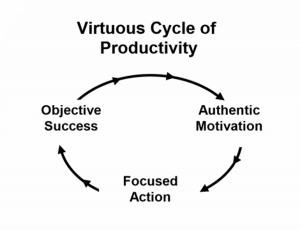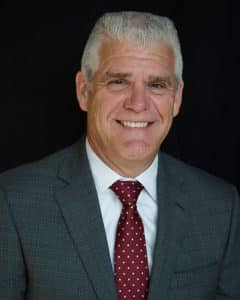The Virtuous Cycle of Student Agency
CompetencyWorks Blog

This is the second of two guest posts by James Neihof, the recent past superintendent of Shelby County Public Schools in Kentucky. The first post is here.
“Young people with high levels of agency do not respond passively to their circumstances; they tend to seek meaning and act with purpose to achieve the conditions they desire in their own and others’ lives.” – Ron Ferguson in: The Influence of Teaching Beyond Standardized Test Scores: Mindsets and Agency (2015)
On a Friday afternoon this past February, middle school teacher Annie Fisk from the Marnel C. Moorman School (MCMS), a K-8 school in Shelbyville, Kentucky posted on Twitter, “…it all went as planned…we had 60+ students at one time engaged for 2 solid hours. It was a day that reminded me why I love my job. I’m so thankful to have my team.”
(I began writing this before the pandemic and school closures, then needed to set it aside to respond to the crisis. But with the school year over, I was able to finish this blog post, and it still feels very relevant to what we need to do, regardless of what format school takes in the fall.)
Student Agency – Ms. Fisk’s Friday afternoon Twitter post is an example of what happens when teachers design learning to capitalize on student agency. Her team’s experience mirrors the prevailing research on student agency. They crafted the unit with critical thinking as a desired outcome. They provided multiple discourse questions to spawn student choice at every crucial juncture in the learning experience. They designed activities to cause emotional discourse. By Friday afternoon students had built background knowledge all week to determine what it meant to be civilized through an analysis of ancient Rome’s relationship to conquered regions.
Then, on Friday, the teachers unleashed the deep question, the emotionally charged one. Their charge was to consider their opinions about Rome in the context of our nation’s relationship with American Samoa. Their lesson design and implementation demonstrates what happens when students have agency: they are far more likely to find purpose in learning, be motivated to persist through challenges, and be able to manage their progress in learning. These students had purpose because of driving questions and contemporary articles that made ancient Rome relevant to modern topics. They persisted because of a well-established classroom community with high expectations that they were key drivers of their own education. And they could manage their own learning progress because of frequent feedback from teachers on next steps to achieve mastery, as well as discourse with other students that allowed them to ask questions, be reflective on what they had learned, and teach other students.
Empowerment – We humans want power over our own lives. This universal fact applies for all of the humans in our schools: students, teachers, administrators, and others. It is innate. We can’t turn it off. We just want power. Competency-based education (CBE) systems capitalize on the universal human desire for power. In fact, CBE systems require empowerment. Teachers like Ms. Fisk are finding that where CBE practices thrive, highly active and productive learners thrive too. Empowerment of everyone involved in the learning process is at the core of the CBE movement.
Building Student Agency at MCMS – At MCMS, Principal Donna Jones-Hocker is intentional about giving students power: student agency. They put into practice three factors that align perfectly with Design Principle #7 of the Quality Principles for Competency-Based Education book – “activate student agency and ownership.” These three factors, explained next, are coaching, meaningful information, and opportunities.
- Coaching – While some level of agency is innate in people, Ms. Jones-Hocker believes it requires skill to be a strong self-advocate as a learner. This self-advocacy skill is developed through coaching. Her MCMS students who presented at a February, 2020 University of Kentucky Center for Next Generation Leadership cohort meeting talked about how they are being coached to self-regulate and self-monitor through personalized learning plans. As the students talked about their learning journey and answered questions from the audience of Kentucky educators, they repeatedly referenced how teachers use advisory time to grow and encourage student agency. It was as if the student advisory time is the secret sauce of student agency at MCMS.
Teachers are learning to use advisory systems across Shelby County to intentionally grow productive empowerment. Tapping into the human drive for power and control is why principals like Donna Jones-Hocker, Ms. Fisk’s principal, encourage and help teachers turn to instructional approaches that hinge on giving learning a personal purpose for each learner. Ms. Jones-Hocker and the MCMS teachers believe this requires each learner to be a co-designer of the learning; to tell the teacher what he or she wants to know or understand and then help create, with the teacher, a personalized plan to give the learner the power and agency to learn. Their experiences point to the likelihood that an advisory system is a crucial necessity for empowered learners to emerge in a competency-based school.
- Meaningful Information – Empowering a learner requires that the teacher be fully transparent, trusting the learner. Trusting the learner is often the hard part for the teacher. I get it. Trust is hard for me too. Fortunately, the trust required for student agency to blossom is a manageable level of trust. This level of trust only requires trusting learners with three things to release full agency to learners. They are:
- Full access to any information available about the learning target(s),
- Full authority to co-adapt with the teacher a personalized artifact to demonstrate mastery on the learning target(s) without altering the mastery scale,
- Real-time feedback from self, peers, and adults on where they are in learning progress based on a clear mastery scale and progress toward creation of a “drop the mic” artifact.
- Opportunities – Ms. Fisk and her teammates co-led two hours of fully engaged middle-schooler learning time that Friday afternoon, because they designed to the edges for all of the kids. The result she tweeted about was the evidence. That result happened because every learner was provided with real opportunities to practice the skills necessary to be an independent learner. It happened because they planned for it. It wasn’t an accident.
An Agency Movement Is Snowballing – Agency and ownership are crucial components of CBE. Not only at MCMS, but all across the Shelby County Public Schools district, we see an increasing ability of students to guide their own learning. As agency increases, the power dynamics in classrooms change. There is a snowball effect happening. Some researchers call this snowball effect a virtuous cycle.
 Here Is the Virtuous Cycle Being Created –
Here Is the Virtuous Cycle Being Created –
- Authentic Motivation – When our kids have a strong advisory structure, they have a clear personalized learning plan.
- Focused Action – When a student’s plan transparently defines what the student needs, teachers guess a lot less about what the learner needs and are more likely to successfully plan for right where the learner is.
- Objective Success – When the learning target the teacher co-planned with the student meets the student where she is, she feels more engaged. When she is engaged, she can be given far more autonomy over how she learns and how she will demonstrate mastery through tasks that interest her. This autonomy makes learning purposeful, more personal, and more fun, so both teachers and students want to do it over and over.
Reflection – Ms. Fisk’s Friday afternoon tweet described what every teacher dreams of, that perfect day when every learner is engaged, every learner transfers what was learned previously to a new or novel situation (ancient Rome and American Samoa), the “drop the mic” day when you just know they know. In a world filled with teacher shortages and low teacher pay, I’m all for supporting educators like Ms. Fisk and Ms. Jones-Hocker so we can read more tweets that say, “…it all went as planned…we had 60+ students at one time engaged for 2 solid hours. It was a day that reminded me why I love my job. I’m so thankful to have my team.”
Learn More
- The Learning Sciences: How the Brain Was Built to Learn
- What Do You Mean When You Say “Student Agency”?
- Strategies for Building Student Ownership of Their Learning
 James Neihof, Ed.D, retired in June after 12 years as superintendent of the Shelby County Public Schools in Shelbyville, Kentucky. He is currently “exploring his next steps in the competency-based education world.” In 2013 Dr. Neihof led a strategic planning effort to create a roadmap toward personalization of education in the district. That strategic plan paved the way for the creation of a Profile of a Graduate in 2017. In 2018 the district embarked on a second strategic plan designed to prepare graduates to achieve the competencies of the Profile of a Graduate. Under his leadership, the district’s educators participate in Kentucky’s Network of Innovative Schools and Kentucky’s Competency-based Education Consortium. The district’s partners include EdLeader21, Envision Learning, Big Picture Learning, 2Revolutions, Southern New Hampshire University, and the Aurora Institute.
James Neihof, Ed.D, retired in June after 12 years as superintendent of the Shelby County Public Schools in Shelbyville, Kentucky. He is currently “exploring his next steps in the competency-based education world.” In 2013 Dr. Neihof led a strategic planning effort to create a roadmap toward personalization of education in the district. That strategic plan paved the way for the creation of a Profile of a Graduate in 2017. In 2018 the district embarked on a second strategic plan designed to prepare graduates to achieve the competencies of the Profile of a Graduate. Under his leadership, the district’s educators participate in Kentucky’s Network of Innovative Schools and Kentucky’s Competency-based Education Consortium. The district’s partners include EdLeader21, Envision Learning, Big Picture Learning, 2Revolutions, Southern New Hampshire University, and the Aurora Institute.